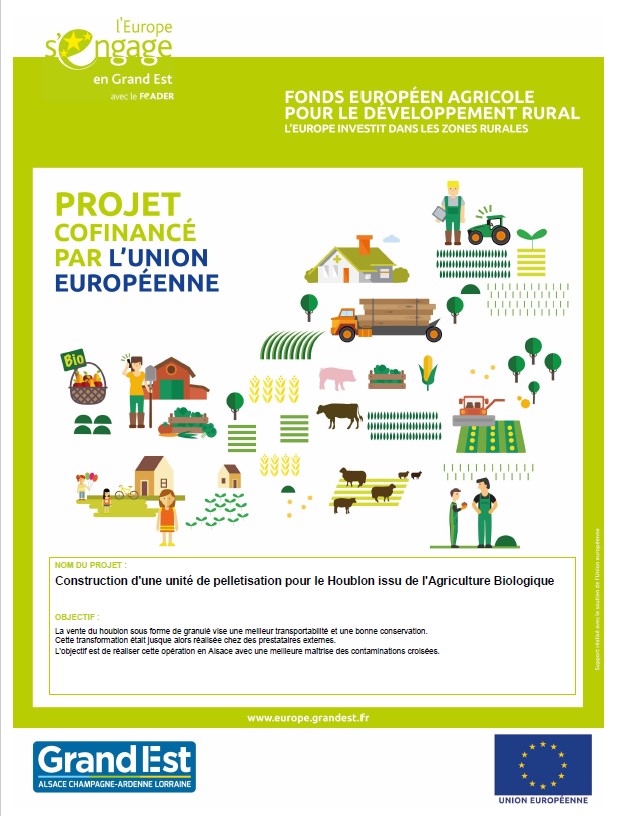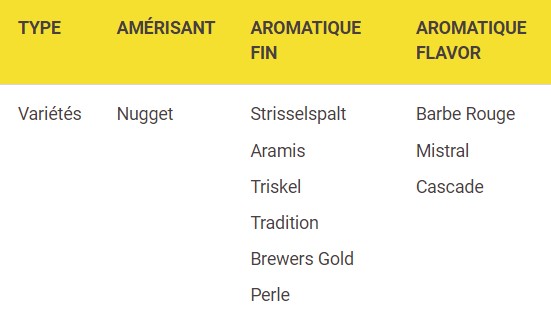We offer you hops from organic farming
Our organic hopsThe organic hops market
Published : 11/27/2024 11:33:35 Categories : Blog
Features of The organic hops market
Situation
COMPTOIR AGRICOLE began producing organically grown hops in 2009 on an area of 18 hectares.
Given the 3-year conversion period to organic farming, the first organic hops were available in 2012.
Production method
The objectives of this production method are to respect natural balances and biodiversity. Production is necessarily of the highest quality, and must be respectful of the environment and human health.
Organic production is based on the non-use of synthetic chemicals or GMOs, the recycling of organic matter and biological control.
Unlike conventional agriculture, manuring is carried out exclusively with compost produced on the farm.
To combat insects, we encourage the development of beneficial insects.

To prevent the development of diseases, manual work is more frequent than in conventional agriculture, and the products used against bio-aggressors are natural, based on minerals and plant extracts.
But the results of the various measures are strongly influenced by climatic conditions and are more irregular than in conventional agriculture.
"BIO” label
Obtaining the “Bio” label is regulated and controlled by an independent certification body: Ecocert France. It takes no less than 3 years to convert and obtain this label.
A changing market for organic hops
After rapid growth in the 2010s, the organic hops market is now experiencing a phase of stagnation, or even slight decline. This trend reflects a general decline in the consumption of organic products, due to economic constraints and competition from other labels such as HVE (Haute Valeur Environnementale).
However, demand remains stable in the craft micro-brewery sector, which is looking for high-quality ingredients.
Hop France: a key player in organic processing
Faced with these challenges, Hop France, a spin-off from Comptoir Agricole, continues to innovate to meet the expectations of producers and brewers. In 2020, the brand launched a pelletizing unit in Alsace, thanks to support from the European FEADER program.

This equipment enables organic hops to be processed into pellets directly on site, improving transportability, conservation and limiting cross-contamination.
Prior to this investment, processing was outsourced, increasing costs and logistical risks.
A diversified organic range
Hop France offers hop varieties adapted to the needs of brewers, ranging from Alsatian classics like Strisselspalt to innovative varieties like Triskel and Aramis.
These choices make it possible to customize recipes while maintaining eco-responsible production.
The main varieties in the COMPTOIR AGRICOLE range produced to date are :

Agronomic constraints
Organic production is based on the non-use of synthetic chemicals and GMOs, the recycling of organic matter and biological control.
Unlike conventional farming, manuring is carried out exclusively with compost produced on the farm.
To combat insects, we encourage the development of beneficial insects.
Using ladybugs to control insects - Photo
Pesticide-free hop growing in Alsace - Photo
To prevent the development of diseases, manual work is more frequent than in traditional agriculture, and the products used against bio-aggressors are natural, based on minerals and plant extracts.
However, the results of the various measures are strongly influenced by climatic conditions and are more irregular than in conventional agriculture.
Economic constraints
There's a paradox in the brewing world: the creation of a brewery will generate a need for hops that won't be available until two years after planting!
Breweries contract their needs over several years, which also gives growers visibility.

This paradox is all the more restrictive for organic hops, as a third year of conversion is required.
Outlook and resilience
Despite the difficulties associated with a shrinking market, Hop France has positioned itself as a leader thanks to its commitment to sustainability and innovative solutions such as pelletizing.
Our mastery of processing and product diversification are key to ensuring the long-term future of the organic hop sector, which is essential to the development of more environmentally-friendly agriculture.

